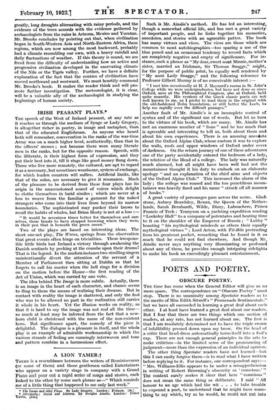IRISH PEASANT PLAYS.*
Tan speech of the West of Ireland peasant, at any rate as it reaches us through the medium of Synge or Lady Gregory, is altogether richer in poetry, in image and metaphor, than that of the educated Englishman. As anyone who heard both will remember, conversation in the ranks of the war-time Army was on a much higher level, aesthetically, than that in the officers' messes ; not because there were many literate men in the ranks, but for the opposite reason. Speech, with the illiterate, is their highest form of expression, and they put their best into it, till it rings like good money flung down. Those who live more remotely, the cultured, are apt to regard it as a necessary, but sometimes wearisome, system of exchange, for which leaden counters will suffice. Artificial limits, like that of the salon, are necessary to give it resonance. Much of the pleasure to be derived from these four plays has its origin in the unaccustomed sound of voices which delight to clothe themselves in lucid similes ; which are never at a loss to weave from the familiar a garment for the naked strangers who come into their lives from beyond its narrow boundaries. The sophisticated may pucker their brows to recall the habits of whales, but Brian Hosty is not at a loss :—
" It would be seventeen times better for themselves and our- selves, those beasts to have stopped browsing where they were, in their pen that is beneath the green ocean."
Two of the plays are based on interesting ideas. The short one-act play, The Wrens, springs from the observation that great events often hinge on trivialities. These irrespons- ible little birds lost Ireland a victory through awakening the Danish sentinels by pecking at the crumbs upon their drums! That is the legend. In the modern instance two strolling singers unintentionally divert the attention of the servant of a Member of Parliament then sitting at Dublin so that he forgets to call his master when the bell rings for a division on the motion before. the House—the first reading of the Act of Union, which was carried by one vote.
The idea behind The Image is more subtle. Actually, there is an image in the heart of each character, and chance seems to fling to them the means of realizing their dreams. But in contact with reality the image is shattered, and only the fool who was to be allowed no part in the realization still carries it whole in his heart. Yet the illusion works on reality, so that it is hard to say the image was not teal all the time— so much at least may be inferred from the fact that a new- born child is christened with the name of the non-existent hero. But significance apart, the comedy of the piece is delightful. The dialogue is a pleasure in itself, and the whole play is an example of admirable workmanship in which the various strands of feeling are cunningly interwoven and tone and pattern combine in a harmonious effect.


































































 Previous page
Previous page